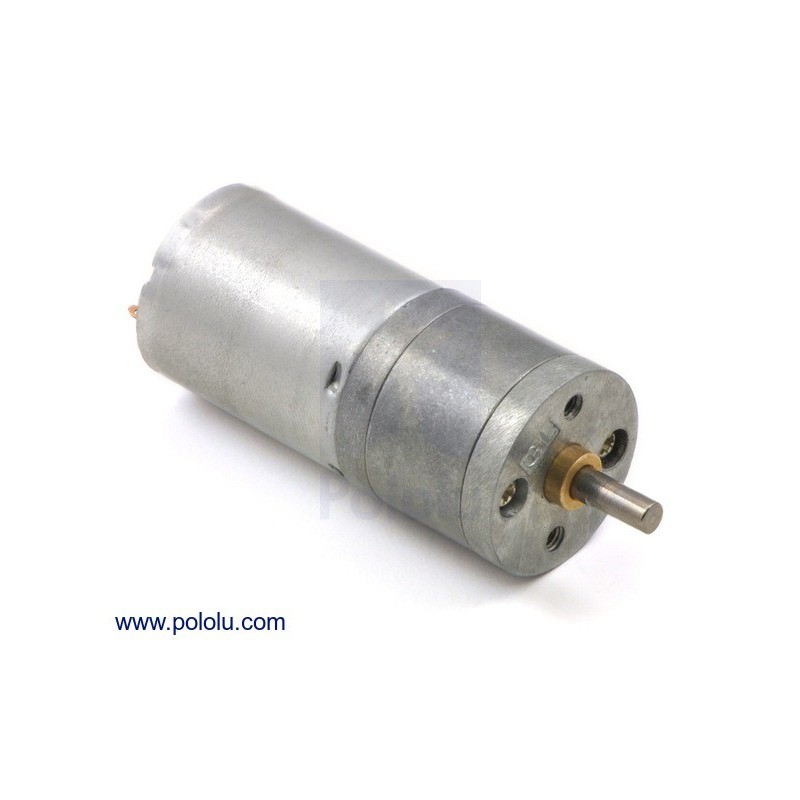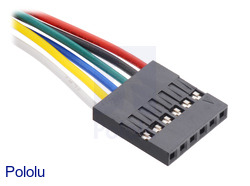In general, these kinds of motors can run at voltages above and below
their nominal voltages; lower voltages might not be practical, and
higher voltages could start negatively affecting the life of the motor.
Details for item #3256
Exact gear ratio: 22×20×22×22×22×22×2412×12×10×10×10×10×10≈171.79:1
Dimensions
The diagram below shows the dimensions of the 25D mm line of
gearmotors (units are mm over [inches]). This diagram is also available
as a downloadable PDF (223k pdf).
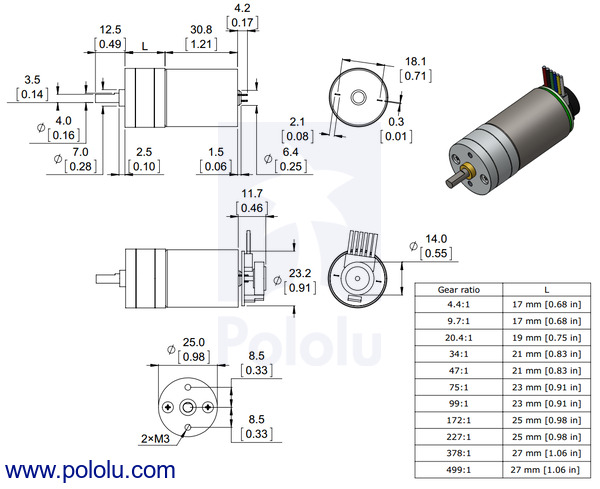 |
Dimensions of the Pololu 25D mm metal gearmotors. Units are mm over [inches]. |
|---|
Warning: Do not screw too far
into the mounting holes as the screws can hit the gears. We recommend
screwing no further than 2mm (0.08″) into the screw hole.
Gearmotor accessories
The face plate has two mounting holes threaded for M3 screws. You can use our custom-designed 25D mm metal gearmotor bracket
(shown in the picture below) to mount the gearmotor to your project via
these mounting holes and the screws that come with the bracket.
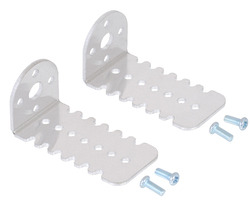 | Pololu 25D mm metal gearmotor bracket pair. |
|---|
|
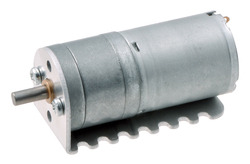 | Pololu 25D mm gearmotor with bracket. |
|---|
|
The 4 mm diameter gearbox output shaft works with Pololu universal aluminum mounting hub for 4mm shafts, which can be used to mount our larger Pololu wheels
(60mm-, 70mm-, 80mm-, and 90mm-diameter) or custom wheels and
mechanisms to the gearmotor’s output shaft as shown in the left picture
below. Alternatively, you could use our 4mm scooter wheel adapter
to mount many common scooter, skateboard, and inline skate wheels to
the gearmotor’s output shaft as shown in the right picture below.
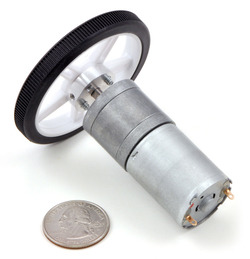 | Pololu 60×8mm wheel on a Pololu 25D mm metal gearmotor. |
|---|
|
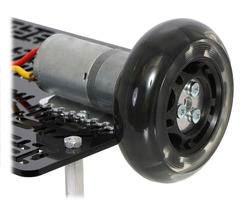 | A 25D mm gearmotor connected to a scooter wheel by the 4 mm scooter wheel adapter. |
|---|
|
These are the same type of motors used in the Wild Thumper all-terrain chassis, so the gearbox’s output shaft also works directly with the hex adapters included with the 120mm-diameter Wild Thumper wheels (the left picture below shows a 25D mm gearmotor while the right picture shows the smaller 20D mm gearmotor):
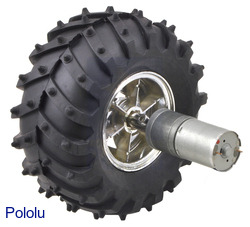 | Dagu Wild Thumper wheel 120×60mm (chrome) with Pololu 25D mm metal gearmotor. |
|---|
|
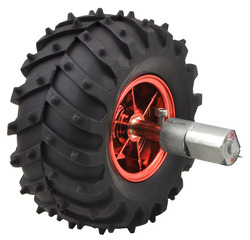 | Dagu Wild Thumper wheel 120×60mm (metallic red) with Pololu 20D mm metal gearmotor. |
|---|
|
For a general-purpose hex adapter, consider our
12mm hex wheel adapter, which lets you use this motor with many common hobby RC wheels.
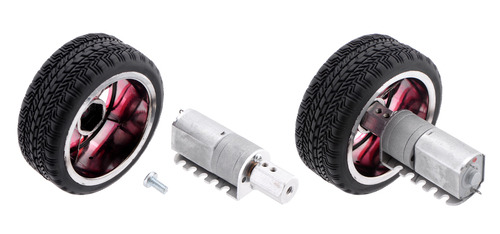 |
12mm Hex Wheel Adapter for 4mm Shaft on a 20D mm Metal Gearmotor. |
|---|
We have a number of motor controllers and motor drivers
that work with these 25D mm metal gearmotors. For the LP and MP
versions, we recommend our MC33296-based motor drivers, for which we
have basic single and dual carriers and a dual-channel shield for Arduino. For the HP versions, we recommend our VNH5019-based motor drivers (available as single and dual carriers),
though these can also be a good choice for the lower-power motors
because they will run much cooler than the MC33926 carriers. If you are
looking for higher-level control interfaces, such as USB, RC, analog
voltages, or TTL serial, consider our Simple Motor Controllers, Jrk motor controllers, or TReX motor controllers;
these controllers are available in various power levels, and the
appropriate one depends on the particular version of 25D mm motor you
have (we generally recommend a motor controller that can handle
continuous currents above the stall current of your motor).
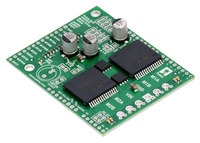 | Pololu dual VNH5019 motor driver shield for Arduino. |
|---|
|
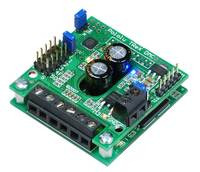 | Pololu TReX Dual Motor Controller. |
|---|
|
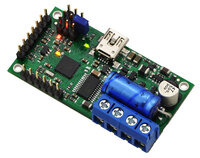 | Simple Motor Controller 18v7, fully assembled. |
|---|
|
We have an assortment of Hall effect-based current sensors to choose from for those who need to monitor motor current:
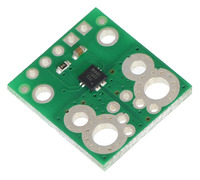 | ACS711EX current sensor carrier -15.5A to +15.5A. |
|---|
|
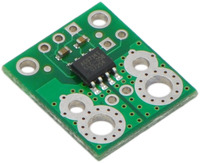 | ACS714 current sensor carrier -5A to +5A. |
|---|
|
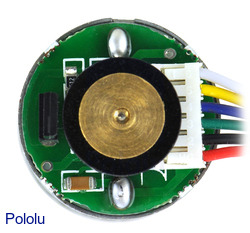 |
25D mm metal gearmotor with 48 CPR encoder: close-up view of encoder. |
|---|
Using the encoder (if applicable)
The versions of these gearmotors with encoders use a A two-channel
Hall effect sensor to detect the rotation of a magnetic disk on a rear
protrusion of the motor shaft. The quadrature encoder provides a
resolution of 48 counts per revolution of the motor shaft when counting
both edges of both channels. To compute the counts per revolution of
the gearbox output, multiply the gear ratio by 48. The motor/encoder
has six color-coded, 8″ (20 cm) leads terminated by a 1×6 female header
with a 0.1″ pitch, as shown in the main product picture. This header
works with standard 0.1″ male headers and our male jumper and precrimped wires.
If this header is not convenient for your application, you can pull
the crimped wires out of the header or cut the header off. The
following table describes the wire functions:
| Color |
Function |
|---|
| Red |
motor power (connects to one motor terminal) |
| Black |
motor power (connects to the other motor terminal) |
| Green |
encoder GND |
| Blue |
encoder Vcc (3.5 – 20 V) |
| Yellow |
encoder A output |
| White |
encoder B output |
The Hall sensor requires an input voltage, Vcc, between 3.5 and 20 V
and draws a maximum of 10 mA. The A and B outputs are square waves from
0 V to Vcc approximately 90° out of phase. The frequency of the
transitions tells you the speed of the motor, and the order of the
transitions tells you the direction. The following oscilloscope capture
shows the A and B (yellow and white) encoder outputs using a motor
voltage of 6 V and a Hall sensor Vcc of 5 V:
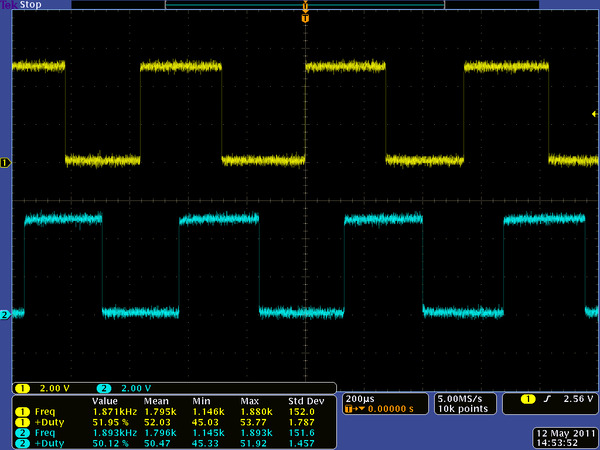 |
Encoder A and B outputs for 25D mm HP 6V metal gearmotor with 48 CPR encoder (motor running at 6 V). |
|---|
By counting both the rising and falling edges of both the A and B
outputs, it is possible to get 48 counts per revolution of the motor
shaft. Using just a single edge of one channel results in 12 counts per
revolution of the motor shaft, so the frequency of the A output in the
above oscilloscope capture is 12 times the motor rotation frequency.
